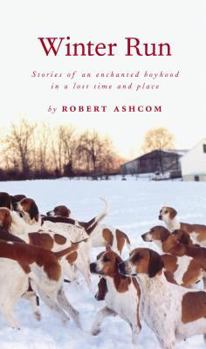Winter Run
Select Format
Select Condition 
Book Overview
There are certain special -- and rare -- books that refresh our understanding of how children see the world. This is one of those books. It's the story of a boy growing up in a lost time in an idyllic place -- rural Virginia of the late 1940s.
Format:Hardcover
Language:English
ISBN:156512328X
ISBN13:9781565123281
Release Date:October 2002
Publisher:Algonquin Books
Length:240 Pages
Weight:0.69 lbs.
Dimensions:0.9" x 4.5" x 7.7"
Customer Reviews
3 ratings
A lovely book with moments of true grace
Published by Thriftbooks.com User , 20 years ago
Reviewers often say of memoirs "It read like a well-crafted novel." This book is the opposite: a novel that reads like a well crafted memoir. The writing is gorgeous and lush, and the story introduced me to Charlie, a child of city folks who move to the country in the 1940's. I was captured by his deep connection to the natural world and moved by the inevitable loss of his innocence. I highly recomend this rich and layered read.
The True and Forgotten Crops of Farming
Published by Thriftbooks.com User , 21 years ago
"What would you take to read if you were going to a desert island?" Shakespeare and the Bible usually head most quick lists, but more extended reflection usually hones in on categories. "Fiction?" "NonFiction?" "Poetry?" "Books?" "Magazines?" We were reminded this week that William Faulkner's hunting stories are our continuing choice of fiction (or semi-fiction). Ever since we discovered them ("The Bear," "Delta Autumn," "The Old People," and the rest) over forty years ago, they have represented the essence of transcendentalism, the spiritualization of nature, the romanticizing of youthful innocence and of love of simplicity, and a vanishing rural southern landscape recalled and enshrined. But we had not realized what a vacuum absorbing those stories long ago had left in our soul, what an ache and emptiness we felt because the link they expressed for us between youthful innocence and primitive woods had been left behind for decades, with no literary replacement in sight. Faulkner was gone, Eden had vanished, we had aged, the woods had been carved and asphalted and wired, and we had learned to live amidst modernity, masses, and motion. The woods had been our first school, and being grown and gone from them, we learned to substitute real campuses for those vanished cathedrals. But it is not the same. Sheerly by chance we lucked upon a little book by Robert Ashcom: Winter Run: Stories of an enchanted boyhood in a lost time and place (Algonquin Books of Chapel Hill, 2002). Ashcom is a farmer-writer in Warrenton, VA, who has been a school teacher, a breeder and trainer of thoroughbred horses, and master of hounds and huntsman for the Tryon Hounds in NC half an hour away from us. Set in Virginia, probably near Charlottesville, Winter Run is the episodic account of the coming age of young Charlie Lewis in the post World War II years. The stories are very Faulkneresque. Charlie Lewis, whom we watch grow (in wisdom, stature, curiosity, interests) from age six to fifteen, reminds us of Chuck Manson, and his black mentor, Matthew, is an evocation of Faulkner's Antaeus-like Ike McCaslin or Sam Fathers, stewards of the old ways at one with the land. Each Ashcom story stands on its own merits, but all are linked through recurring central characters and the chronicle of Charlie's development and the presence of native storytellers. In assorted episodes, Charlie defies authority by facing down a huge boar in a pigpen, falls in love with a one-eyed mule, buries the mule, gets a pony, encounters a red-tailed hawk, watches his absentee executive father turn into a hero through conquering a roaring forest fire, hunts possums, learns about fox hounds, learns foxhunting, tracks and pets a gray vixen fox, learns about bird dogs, participates in November hog killings, captures a cottonmouth snake, and attends funerals of family and mentors. But these are only the "occasions", milestones in a boy's evolution. What gives them meaning is author Ashcom's abili
A return to great literature
Published by Thriftbooks.com User , 22 years ago
Robert Ashcom is a master of sewing magic and emotion into the English language. His newest novel, WINTER RUN, invites readers to walk through rural Virginia in the 1940s. The story is set around Charlie, a curious, adventuresome boy (think Huck Finn) and his family, friends, animals and farm. It is with these aspects of life - family, friends and duty - that the proud young boy becomes a strong but sensitive man. Now, most critics may associate 'rural' with boring, but not so in WINTER RUN. What audiences must pay attention to, in my opinion, is Ashcom's verbal sorcery. He snaps photographs with words and tells fireside stories with narrative; his work commands the attention of anyone with serious interest in American literature.






